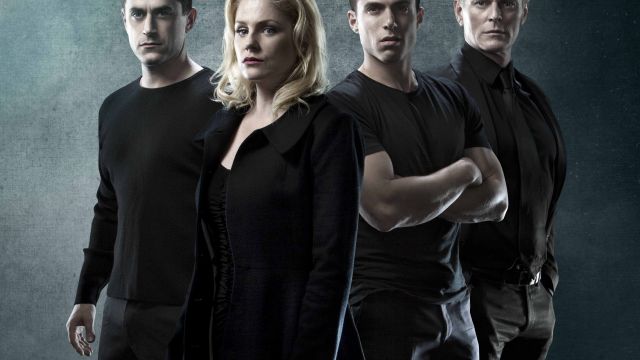Blood Brothers
Say what you like about Willy Russell’s music theatre show Blood Brothers, it keeps coming back. The story of twins separated at birth and divided by class, and of their grieving but resilient mother, it opened at the Liverpool Playhouse in 1983. From there it went to the West End and won the Lawrence Olivier Award for Best New musical, went on tour for a year, had its Australian premiere in 1988, went to Broadway, (six Tony nominations) in 1993… and, after ten thousand performances, was still running in the West End in 2012.
Of course, it wouldn’t – or couldn’t - keep coming back if audiences didn’t love it – didn’t laugh at its broad humour, feel outrage at its class-based cruelty and cry at its tragedy. Contrived? Melodramatic? Sure, but so what? The strength of Blood Brothers is its unashamedly emotional story. The show also demonstrates Willy Russell’s great sympathy for and admiration of working class women – as in his Educating Rita and Shirley Valentine. But Mrs Johnstone, heroine of Blood Brothers, achieves no epiphany. She is beaten – or terribly punished - by Fate, an exigency of which Russell reminds us, rather heavy-handedly, over and over.
This production plays in a refurbished cinema – once The George, now the Alex – which means a sort of proscenium arch stage without the proscenium arch. A big round of applause for the management is opening a new live theatre venue where productions like this can shine. And another round of applause for Enda Markey in mounting this ambitious show a second time after its run in Sydney.
The set by Anna Gardiner is ingenious, suggestive and multi-purpose. Christopher Page’s lighting conveys transitions and the passage of time effectively as well as pointing up the characters’ emotions and their moments of isolation and misery. Andrew Pole’s direction makes lively use of what is, in fact, a very small playing space.
The strength of the show is its story of two boys growing up apart and together. Two actors (Bobby Fox and Josh Piterman) must play the lads Mickey and Edward (Eddie) at seven, at fourteen, at twenty and twenty-seven. It’s always entertaining to see adults play children – if done well – and Mr Fox does that and all the stages and steps of working class Mickey’s life extremely well. He gives us such a range of credible emotions – joy, confusion, despair - and his energy fills the stage. Mr Piterman is initially hampered by Willy Russell’s version of ‘upper-middle-class’ dialogue, but gains in credibility as the show rolls on, touching when he declares his always obvious love for Mickey’s girlfriend now wife, Linda (another grounded, funny, real performance from Christy Sullivan).
Here we must mention too the excellent Jamie Kristian in the smaller role as Mickey’s older brother Sammy. He exploits the fact that Sammy’s got a plate in his head after a fall and turns in a crazy, frenetic and menacing performance that disturbs and mesmerises. I await something bigger for him.
Michael Cormick as the Narrator (as well as a milkman, a Bobby and a detective), sings beautifully and with great presence. His problem lies with the text in that the role of Narrator is really quite redundant – he keeps telling us what the actors in the story have already made clear - and his dark notes about fate, curses and the Devil become risibly portentous and serve only to point up the melodrama in a piece that is already quite melodramatic enough.
As for Erin James, also playing multiple roles, anyone who’s seen the recent movie, The Little Death, can never forget her in the final segment; she’s the best thing in the picture. Here she brings a warmth and vitality to one of the kids’ gang and even to a secretary being fired.
Helen Dallimore, in the ‘coveted role’ of Mrs Johnstone, was rumoured to be ill at the performance I saw (the official opening night). If that were so, it would explain that she was not her usual bubbly, energetic (and award winning) self. Despite that, she got her character’s resilience and ironic humour, even if otherwise she was just a little flat. But when she appears at the climax and cries, ‘He’s your brother!’ it still, no matter what, packs a visceral punch. There is no doubt Ms Dallimore can and will do better as the run continues.
Other cast, however, seem to play outside their characters, as it were. That is, there’s a lack of interior life. Matt Edwards, albeit in small and unrewarding roles – particularly Mr Lyons - has a kind of goofy charm, but that’s as far as it goes. Bronwyn Mulcahy as Mrs Lyons, the woman who ‘adopts’ Edward, one of the twins, unfortunately passes up the opportunity to make us feel for this childless, emotionally constipated woman; there’s no nuance and she comes across as merely unfeeling and even a little unhinged. I wonder if director Andrew Pole opted for such binary characterisation. If so, it lessens the tragedy.
All that said, the audience appeared to have a very good time. You can’t beat a good story; if you’ve got one, the audience will forgive or not even notice the flaws.
Michael Brindley
Subscribe to our E-Newsletter, buy our latest print edition or find a Performing Arts book at Book Nook.

